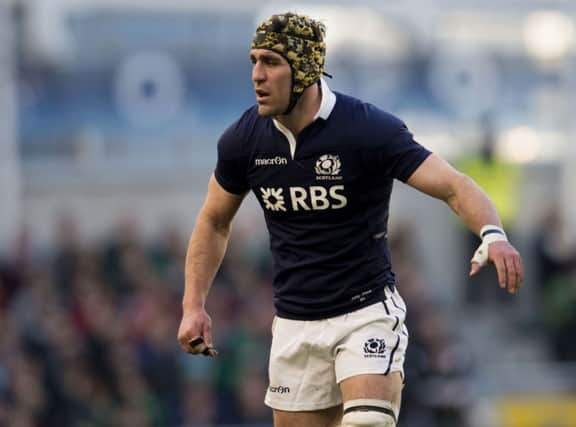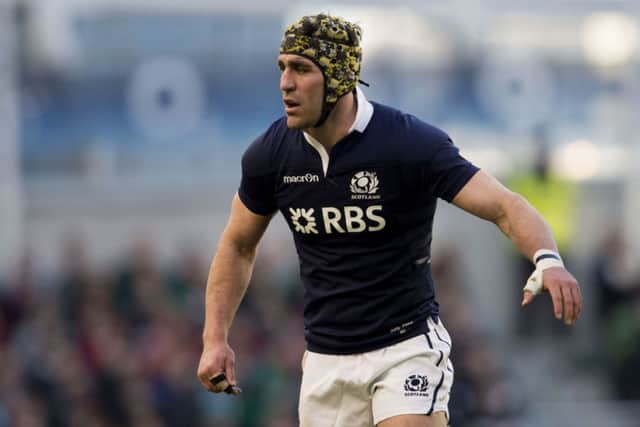Scotland need to turn nasty, says Budge Pountney


Searching for answers to another underwhelming Scottish start can feel akin to wading through an equatorial rain forest at the height of monsoon season. Little is clear and we can put a lot of effort in without feeling as if any ground has been made. Across the squad Johnson and his assistants were last night determining which changes to make, Sean Maitland the only player definitely ruled out by injury but others finding walking tough as the physical pain joined the mental suffering during analysis of Sunday’s 28-6 defeat in Dublin.
One debate that is cropping up time and again, however, is whether Scotland need to play a genuine openside flanker, someone mentally and physically suited to the unique role; an agile, dexterous forward with the same enthusiasm for playing on the ground as a pig in muck.
Advertisement
Hide AdAdvertisement
Hide AdOn the flight home from Dublin I wondered what had happened to our ‘devils’. Not just in the back row. Where are the successors to David Leslie, Colin Deans, Gary Armstrong, Peter Wright or Budge Pountney? They had skills, sure, but they were figures that opponents took a real dislike to, players who got under the skin. Has professionalism softened them?


Pountney came to mind as England hove into view and memories returned of the way in which he got to England captain Matt Dawson and others in the 2000 Calcutta Cup at Murrayfield, and revealed afterwards that that had been a central tenet in the Scots’ plan.
Intriguingly, the forgotten man Allister Hogg filled the No 7 jersey in the 2006 and 2008 triumphs, and reminded all and sundry in last week’s Scotland A game just how effective an operator he still is, despite being overlooked for five years.
Pountney is a big fan of Kelly Brown, describing him as “fantastic”, and said he would not like to be the selector with a clutch of talented back rows to fit into a balanced trio. But as he explained what it took to be an effective openside, Brown’s strengths began to fade from the mind. “When you look at the modern game virtually all the top teams have out-and-out 7s, who play there continually week in week out, and are built to play 7 mentally and physically,” he said. “You don’t become an openside flanker in a year or two; you grow over many years to understand that role.
“When you look at the best opensides, they just don’t stop moving or scrapping, being in the face of the opposition, or being the first one to the contact situation.
“Playing there you have to block everything out. You generally aren’t the biggest player on the pitch, and so are constantly taking big impacts, so you have to be able to take the knocks and graft it out; block out everything going on around you, and focus on where you need to be, in attack, defence, off set-piece etc.
“It’s about being as close to the ball as you can for the majority of the game, but also being clear-headed and having your head up so you can see where the opposition is going and read the patterns. You have a game with your opposite number and work hard to put their half-backs into positions they don’t want to be. And you have to be prepared to be hurt. It’s going to hurt. When you’re over that ball your eyes are down, you can’t worry about what is coming, and when an 18- or 19-stone boy hits you, it hurts. You have to be prepared to be broken.
“But, it is a specialist position and just as you wouldn’t ask a loosehead to play tighthead at international rugby you shouldn’t expect a blindside flanker or No 8 to be able to slip in there at Test level.”
Advertisement
Hide AdAdvertisement
Hide AdBrown has some of those skills, but he grew up as a skilful No 8, and has played blindside more often too. His blend of skills and consistency which few others can match make him almost indispensable, and he suffered along with back-row colleagues on Sunday due to the lack of a consistent platform from the front five that he enjoys with Saracens.
While Greig Laidlaw hides a fiery side to his character, Ross Ford is one of the most affable hookers in the game. Is it because he and Brown have always been big and skilful players – Ford also grew up as a ball-playing No 8 – so missing any ‘small man syndrome’ chip on the shoulder that can actually drive people in sport?
“I don’t know,” continued Pountney, “but most opensides do spend their careers trying to prove themselves in a big man’s world, having to fight every week to get respect, and that translates into games.
“The game has changed since I played, but opensides, hookers and scrum-halves still have to be aggravating, turning the screw and stretching the laws as far as they can. Hookers have to because they’re right at the forefront of a physical battle, scrum-halves have to get the forwards moving, crack the whip, and be in the face of the opposition nine, and the sevens have to be a right pain in the backside at the breakdown, again and again, as Richie McCaw is. 7s are really frustrated 9s, hookers are frustrated 7s and 9s are just frustrated, horrible little men.
“But, when you first start playing that side doesn’t naturally come to you. It’s only when you play more and more you realise ‘this is part of my job’.”
The key for Johnson as he seeks to leave a legacy in his final tournament as head coach is essentially the same as all coaches before him – how to make the most of the talents at his disposal. That is what he is trying to do with Brown, but he does have options. Brown is more suited in body shape and rugby experience to No 8 or No 6, with David Denton and Ryan Wilson also contenders in both roles. Alasdair Strokosch brings an edge at blindside and Johnnie Beattie some attacking creativity to the No 8 berth.
Chris Fusaro has earned his place in the Scotland squad on merit, a small guy continually proving doubters wrong. There appear to be doubts over whether he can cope physically at Test level, but how would anyone know while he remains uncapped?
More experience is available in John Barclay, who is playing well at Scarlets. He may not do some things as well as Brown but he knows the art of that position better. So does Roddy Grant at Edinburgh. Ross Rennie is an outstanding talent, but despite two tries on his Bristol debut at the weekend he is not considered ready for a return to Test rugby yet.
Advertisement
Hide AdAdvertisement
Hide AdThis is not an indictment of Brown, and one game into the Six Nations is no time for panic moves. But the evidence of recent Test matches suggest Scotland need more than just ‘learning’ and gradual steps of improvement if they are to contest this tournament.
Pountney, who watches English games regularly in his modern guise as an RFU citing commissioner, certainly knows what is required on Saturday. He backs Brown at No 7 if Scotland get on the front foot, but stated: “We need the same kind of approach that won us the game back in 2000.
“England are coming off the back of a result that would have cut through them, because they did enough to win it, but there are weaknesses in the England side. We need a team of people to get in their faces, irritate, and get the English boys thinking about what’s going on in front of them rather than what their game-plan is.
“They have good players but inexperience in the back line. We need to get to Joe Marler and rev him up, the same with the second rows and see if they come out swinging. Attack them in that sense. Danny Care can be fiery as well so get in his pocket and give him a couple of shots. That’s what we’ve got to do in this and every game. We have nothing to lose.
“Traditionally, mentally, we’re tough, aggressive and so we have to use that to our advantage, and get bloody nasty with people.
“In 2000, we went out there and knew exactly what we were doing. We had to take a number of players out of their comfort zones by riling them up. We got into Garath Archer, revved up Lawrence Dallaglio a bit and knew if we got to Matt Dawson that mentally he could be fragile. He was a fantastic player, but we knew if we could get into him mentally and physically he’d become a bit more distant from the contact stuff and he did.
“If you can stay on that mental edge for as long as you can without giving away too many penalties, and making too many mistakes, then you stand a very good chance of winning games. We have done that quite a few times in the Calcutta Cup and few England teams cope well with that.”
THE SCOTSMAN RUGBY SHOW IN ASSOCIATION WITH GINGER GROUSE
SEE ALSO: